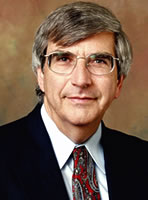RICHARDSON, Texas (March 2, 2005) – The sometimes murky world of international economic development consulting, where dubious advice and self-dealing often trump the legitimate interests of the governments and organizations for which the private advisers work, needs a healthy dose of accountability and ethical standards to reign in corrupt practices, according to two university professors whose groundbreaking work in the field has received a second grant from the Ford Foundation.

Dr. Lloyd Jeff Dumas, professor of economics and political economy at The University of Texas at Dallas (UTD), and Dr. Janine R. Wedel, associate professor of public policy at George Mason University, have received a two-year, $233,000 grant from the foundation to continue an initiative called “Building Accountability Into International Development Advising in an Age of Diffused Governance.” The project was launched in early 2003 with an $180,000 Ford Foundation grant.
“The role of international economic advisers has expanded substantially in the past dozen years, spurred by the needs of the nations of Central and Eastern Europe and the former Soviet Union, as well as by a proliferation of nation-building projects,” said Dumas. “Today, such advisers and consultants not only design, manage and implement aid programs, but also sometimes make crucial decisions on behalf of international organizations and governments.
“Unfortunately, the capacity of these organizations and governments to hold the advisers to account, to monitor their activities, or even to gather independent information has not kept up with the extent to which the role of these consultants and advisers has grown,” he said. “Furthermore, it has clearly been the case that some advisers have engaged in activities that served their personal or professional interest but had the effect of undermining the development goals of those nations and organizations that they were supposed to be serving.”
The problems, Dumas said, run the gamut from bad advice to unethical behavior, such as advising multiple organizations with conflicting interests at the same time, to outright corruption. He likened some modern economic advisers to carpetbaggers who plagued the American South following the Civil War.
“We can’t stop people from proffering bad advice,” Dumas said, “but we can establish international standards and codes of conduct for economic advisers and consultants and create systems and mechanisms to monitor their performance, with the hope of eliciting higher standards of ethical behavior. That’s the aim of this project.”
In the project’s initial phase, Dumas and Wedel drafted a proposed code of ethics to guide the behavior of advisers. According to Dumas, four core principles underpin the prototype code – honesty, integrity, responsibility and professionalism.
Before its authors widely share the specifics of the code, they plan to “vet” the document with some 600 members of the United Nations Development Program based in 130 countries around the world. Once that is completed, Dumas and Wedel plan to implement a pilot program to test the practicality and efficacy of the code.
“No code, no matter how well constructed, can be expected to eliminate unethical behavior,” Dumas said. “But a sufficiently clear and specific code of ethical behavior can help clarify the distinction between those who behave well and those who behave badly, and make it easier to reward the former and punish the latter.”
In addition to codifying ethical behavior for consultants and fostering widespread debate on the guidelines, the project’s goals include the design and distribution of informational materials that outline the desired body of practices and identify common pitfalls in international policy consulting. The materials would be made available to officials throughout the world who deal with foreign economic advisers.
About UTD
The University of Texas at Dallas, located at the convergence of Richardson, Plano and Dallas in the heart of the complex of major multinational technology corporations known as the Telecom Corridor®, enrolls more than 14,000 students. The school’s freshman class traditionally stands at the forefront of Texas state universities in terms of average SAT scores. The university offers a broad assortment of bachelor’s, master’s and doctoral degree programs. For additional information about UTD, please visit the university’s web site at www.utdallas.edu.